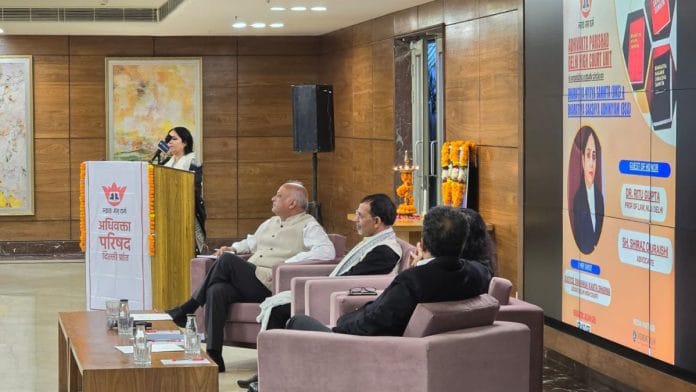New Delhi: Created by Indians for Indians, the three new criminal laws will help the legal system move the focus to justice from punishment, Justice Swarana Kanta Sharma of the Delhi High Court has said. They encapsulate the Hindu values of pashchattap (repentance), focusing on rehabilitative justice and incorporating indigenous values into India’s legal system, she said Friday at a lecture organised by the Akhil Bharatiya Adhivakta Parishad, a lawyers’ association linked to the Rashtriya Swayamsevak Sangh.
Agreeing with the government’s justification for the new criminal laws, Justice Sharma said that legal frameworks like the Indian Penal Code (IPC), the Criminal Procedure Code (CrPC), and the Indian Evidence Act were products of British colonial rule and did not adequately reflect the cultural and social realities of India. Two others who spoke at the event—Professor Ritu Gupta of the National Law University, Delhi and lawyer Shiraz Qureshi—expressed similar views.
Justice Sharma has been in the news for rejecting the bail pleas of several prominent politicians in the Delhi excise policy case—Arvind Kejriwal, Manish Sisodia and Sanjay Singh of the Aam Aadmi Party, as well as K. Kavitha of the Bharat Rashtra Samithi. She also stayed the conviction of Bharatiya Janata Party (BJP) leader and former Union minister Dilip Ray in a coal scam case just before the Lok Sabha elections, allowing him to contest the polls.
During the lecture, Justice Sharma praised the new laws for incorporating principles more aligned with Indian values. For instance, she said, the Bharatiya Nyaya Sanhita (BNS) includes community service as a form of punishment for minor offences, embodying the principle of “pashchattap”—a concept of repentance and rehabilitative justice rooted in Hindu tradition.
“There was no mention of a crime like chain-snatching in the IPC,” she said. Calling it a frequent occurrence in Indian cities, she argued that treating chain-snatching as theft was not ideal. This was a compromise necessitated by absence of a law specifically prescribing it to be treated differently, she said.
She recounted her experience of certain cases that could have been resolved through mediation rather than punishment, such as minor disputes between siblings. She also recalled one case where she ordered social service as a bail condition and was criticised for it, since the law at the time did not explicitly prescribe it as a form of punishment. Although she found it effective, she said, she knew that if it were to be challenged, the order would have been set aside.
“I was thinking to myself, that this person who is 19 years of age, if I send him to jail and he is inside the jail with hardened criminals, am I doing justice? By sending him to jail, I was penalising, him not delivering justice,” she said.
“Today, as a judge, I feel empowered,” she added, “because the focus of the Nyaya Sanhita is nyaya (justice), not penalisation”.
Section 4(f) of the BNS has introduced community service as a penalty for minor crimes, such as theft under Rs 5,000.
(Edited by Sanya Mathur)
Also Read: Can incriminating statements by PMLA accused in one case be used in another? What SC said







So what exactly is the issue here, Ms. Mago? What makes you think that this is an issue worth reporting on? Why is this newsworthy and printable?
Would The Print have reported on this if the judge had addressed a Leftist congregation? Or hobnobbed with the likes of Ms. Romila Thapar or Dushyant Dave or Kapil Sabil?
Why is it even a news article? Do you think it’s a news worthy event?
Anyone attending an RSS event is an issue for you guys.